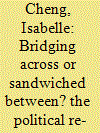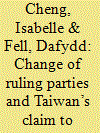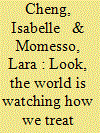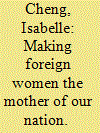|
|
|
Sort Order |
|
|
|
Items / Page
|
|
|
|
|
|
|
| Srl | Item |
| 1 |
ID:
144692


|
|
|
|
|
| Summary/Abstract |
This paper presents the ambiguous and complex political re-socialisation of Chinese immigrant women and their encounter with Taiwanese identity. Contrasting their conceptions before and after migration along a central-peripheral conceptual hierarchy, this paper elaborates how their nationalistic curiosity and understanding of democracy confronted Taiwanese identity in their everyday life. These daily, sometimes mundane, experiences manifested the contradictions between the conceptual hierarchy and the ethnic divide and partisan politics in Taiwan. Their political re-socialisation proved that this conceptual hierarchy was inadequate to deal with the Taiwanese-Mainlander divide and the anti-China sentiment. Political re-socialisation gained through daily life gradually fed into their reaction to the Taiwanese identity. Situated amongst the antagonism between Taiwan and China, they were locked in an in-between form of tension and their subjective identification would therefore be challenged by the mutual suspicion and exclusion of both sides which demand their singular and undivided loyalty.
|
|
|
|
|
|
|
|
|
|
|
|
|
|
|
|
| 2 |
ID:
134307


|
|
|
|
|
| Summary/Abstract |
In recent years, female marriage migration from China and Southeast Asia has significantly increased the number of foreign-born citizens in Taiwan. This article is a preliminary investigation into how political parties responded to the growing multicultural makeup of the national community between 2000 and 2012. We examine the content of the Understanding Taiwan textbook, the election publicity of the two major political parties, citizenship legislation, and the results of interviewing immigrant women. The findings show that the change in the ruling party did make differences in terms of both parties’ projection of immigrant women in election propaganda and citizenship legislation. However, inward-looking multiculturalism is practised by the two main political parties in Taiwan to forge national identity and enhance national cohesion rather than to promote the recognition of immigrants’ different cultural heritage.
|
|
|
|
|
|
|
|
|
|
|
|
|
|
|
|
| 3 |
ID:
154230


|
|
|
|
|
| Summary/Abstract |
Employing the spiral model, this research analyses how anti-human trafficking legislation was promulgated during the Ma Ying-jeou (Ma Yingjiu) presidency. This research found that the government of Taiwan was just as accountable for the violation of migrants’ human rights as the exploitive placement agencies and abusive employers. This research argues that, given its reliance on the United States for political and security support, Taiwan has made great efforts to improve its human rights records and meet US standards for protecting human rights. The reform was a result of multilevel inputs, including US pressure and collaboration between transnational and domestic advocacy groups. A major contribution of this research is to challenge the belief that human rights protection is intrinsic to democracy. In the same light, this research also cautions against Tai-wan’s subscription to US norms since the reform was achieved at the cost of stereotyping trafficking victimhood, legitimising state surveillance, and further marginalising sex workers.
|
|
|
|
|
|
|
|
|
|
|
|
|
|
|
|
| 4 |
ID:
117932


|
|
|
|
|
| Publication |
2013.
|
| Summary/Abstract |
Citizenship awarding is politicised. Conceiving female marriage migration as a national threat, Taiwan's citizenship legislation is consciously designed and purposefully utilised to achieve exclusion and assimilation. Driven by a nationalistic impetus, it shows how Taiwan imagines itself as a modern, prosperous and homogenous nation and projects upon the immigrant outsiders as a threat to its self-identity. Examined through immigrant women's lived experiences, this citizenship legislation is biased by gender, class and ethnicity. The implementation of the legislation is not only an example of symbolic politics but also banal nationalism realised at grassroots level in the private domain. Immigrant women's lived experiences show that exclusion and assimilation stemmed from banal nationalism is not just an operation of symbolic politics but is also enmeshed with their everyday life.
|
|
|
|
|
|
|
|
|
|
|
|
|
|
|
|
| 5 |
ID:
168149


|
|
|
|
|
| Summary/Abstract |
Introduction to Journal of Current Chinese Affairs 2/2018: The Making and Operation of Everyday Authoritarianism in Taiwan during the Cold War
|
|
|
|
|
|
|
|
|
|
|
|
|
|
|
|
| 6 |
ID:
168151


|
|
|
|
|
| Summary/Abstract |
This article examines the role assigned to citizens by the ideology of authoritarianism in the relationship between Chiang Kai-shek’s war to retake mainland China and the wartime regime constructed for fighting that war. Viewing Chiang’s ambition of retaking China by force as an anti-communist nationalist war, this paper considers this prolonged civil war as Chiang’s attempt at restoring the im-paired sovereignty of the Republic of China. Adopting the concept of “necropolitics,” this paper argues that what underlay the planning for war was the manipulation of the life and death of the citizenry and a distinction drawn between the Chinese nation to be saved and the condemned communist Other. This manipulation and demarcation was institutionally enforced by an authoritarian government that violated citizens’ human rights for the sake of winning the nationalist war.
|
|
|
|
|
|
|
|
|
|
|
|
|
|
|
|
| 7 |
ID:
176477


|
|
|
|
|
| Summary/Abstract |
The lives of Southeast Asian caregivers in Taiwan are regulated by a number of laws and policy measures that preclude them from naturalisation, deprive them of a family life, restrict their residency, mobility and employment, and, in the past, have suspended their fertility. They are thus excluded from Taiwanese society and alienated as temporary, supplementary and disposable outsiders in line with broad public opinion. ‘Bringing the state back in’ to its analysis, this article argues that this legislation is not only market‐driven but socio‐politically expedient in that it sanctions the continued employment of foreign caregivers as productive workers rather than as fertile women, while simultaneously casting them as the undesirable other. Taiwan thus becomes a ‘migration state’ with an open economy but a closed national community. Drawing on key government sources as well as longitudinal social surveys, the article demonstrates how this state‐anchored expediency enjoys consistent public endorsement. In focusing on how and why Southeast Asian caregivers' fertility was suspended, it introduces a much‐needed gender perspective to our understanding of how migrant women become ‘disenfranchised class’ in the hostile guest worker system.
|
|
|
|
|
|
|
|
|
|
|
|
|
|
|
|
|
|
|
|
|